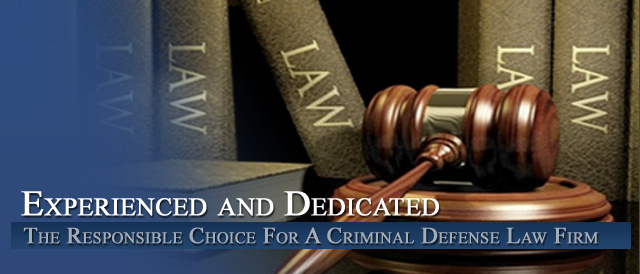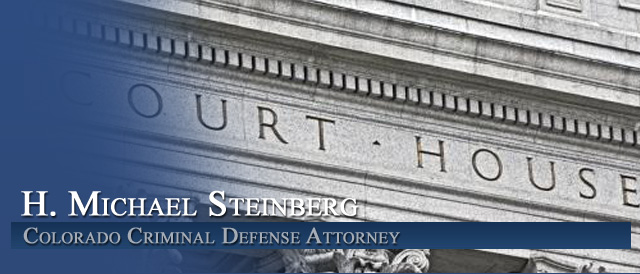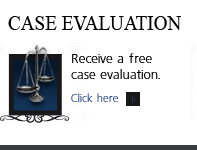




Colorado Criminal Law: Defending Theft Related Crimes in Colorado – The Crime of Theft
by Denver Colorado Criminal Defense Lawyer H. Michael Steinberg
Theft can be charged in many ways in Colorado with several alternative theories of criminal liability and additional charges that can be added to the base crime of theft. This article intends to address the basic forms of theft and some of the additional methods of committing the crime.
Mr. H. Michael Steinberg is an experienced former Senior Trial District Attorney whose thirteen year career as a prosecuting attorney in the courtrooms of the Denver Metropolitan area (primarily Arapahoe and Douglas Counties)and the Front Range of Colorado have led to an exclusive law practice of criminal defense for the last 14 years with a strong emphasis on the negotiation, pre-trial and trial phase of legal advocacy. He has prosecuted and defended dozens of economic crime cases which have included every shape and kind of property crime including state and federal felony theft case.
The Crime of Theft in Colorado
What follows is the primary Colorado State Law on the crime of Theft Colorado is among the substantial majority of states that combine the crimes of larceny, embezzlement, and theft under false pretenses in a single crime of theft.
According to the law, a person commits the crime of theft when he knowingly obtains or exercises control over anything of value of another without authorization or by threat or deception,
…..and in addition he either intends to permanently deprive the other person of its use or benefit; demands a consideration to which he is not legally entitled to return it;
or
uses, conceals, or abandons it with the intent to, or at least the knowledge that his conduct will, permanently deprive the other person of its use or benefit. See § 18-4-401 (1), C.R.S.
Whichever way the crime is committed, it constitutes the offense of “theft.”
Unless a theft is committed from the person of another (by means other than those constituting robbery), see § 18-4-401(5), its categorization as either misdemeanor theft or a particular class of felony depends upon the “value of the thing involved.” § 18-4-401(2).
Multiple thefts committed by the same person within a six-month period, of things with an aggregate value in the felony range ( $1,000.00 or more), constitutes a single crime of theft, the classification of which is determined by the total value of all of the things involved.
§ 18-4-401(4) – The Aggregation of Long Term Theft Crimes
All thefts committed by the same person within a six-month period may be joined together and prosecuted as a single felony. The United States Supreme Court refers to this aggregation as a “unit of prosecution.”
Section 18-4-401(4) treats as a single theft all thefts committed by the same person in a six-month period.
An offense of theft is complete and may be separately prosecuted when one knowingly controls the property of another without that person’s authorization and either has an intent at that moment to permanently deprive the other person of its use or treats the property in a manner that he intends to, or at least knows will, permanently deprive the other person of it.
Theft By Receiving ( stolen goods ) – Joint Prosecution
In 1975, the General Assembly enacted a theft by receiving statute as follows:
Theft by receiving. (1) . . . [A] person commits theft by receiving when he receives, retains, loans money by pawn or pledge on, or disposes of anything of value of another, knowing or believing that said thing of value has been stolen, and when he intends to deprive the lawful owner permanently of the use or benefit of the thing of value.
§ 18-4-410, Theft by receiving is recognized as a particular type of theft.
A prosecutor has discretion to charge any applicable offense. Even if there is a specific criminal statute covering a fact pattern, the DA is not prevented from a prosecution under a general criminal statute unless the Colorado State Legislature has shown an intent to limit prosecution to the special statute.
For example the passage of a specific criminal statute relating to the crime of embezzlement of public monies does not preclude a DA from the prosecution of that same offense under the general theft statute… and the existence of a specific statute dealing with misuse of credit cards does not preclude prosecution of the defendant under the general forgery statute.
In determining whether the General Assembly intended by enacting a specific statute to preclude prosecution under a general statute, the tests are:
(1) whether the statute invokes the full extent of the state’s police powers;
(2) whether the specific statute is part of a comprehensive and thorough regulatory scheme to control all aspects of a substantive area; and
(3) whether the act carefully defines different types of offenses in detail.
When the crime of theft by receiving was passed into law the Colorado State Legislature never intended to accomplish any of these goals.
The crime of theft by receiving is intended to reach a distinct group of wrongdoers who receive, retain, or dispose of property received from another person with the knowledge or reasonable belief that the property has been stolen.
A single transaction may give rise to the violation of more than one criminal statute.
A person in Colorado cannot be found guilty of both theft and theft by receiving for the same acts the DA must elect which charge would be prosecuted.
A defendant can potentially be convicted of either theft or theft by receiving but not both.
Where the alleged conduct of a defendant violates both the general theft statute and a more specific theft statute, the more specific crime need not necessarily be charged; instead, the prosecuting attorney may determine the statute under which to prosecute the alleged crime.
It is within the DA’s prerogative to choose the statute under which to prosecute a defendant.
The Colorado Law on the general crime of Theft:
Colorado Misdemeanor and Felony Theft
Theft (18-4-401)1.
A person commits theft when he knowingly obtains or exercises control over anything of value of another without authorization, or by threat or deception, and:
(a) Intends to deprive the other person permanently of the use or benefit of the thing of value; or
(b) Knowingly uses, conceals, or abandons the thing of value in such manner as to deprive the other person permanently of its use or benefit; or
(c) Uses, conceals, or abandons the thing of value intending that such use, concealment, or abandonment will deprive the other person permanently of its use and benefit; or
(d) Demands any consideration to which he is not legally entitled as a condition of restoring the thing of value to the other person.
(1.5) For the purposes of this section, a thing of value is that of “another” if anyone other than the defendant has a possessory or proprietary interest therein.
2.Theft is:
(a) (Deleted by amendment, L. 2007, p. 1690, § 3, effective July 1, 2007.)
(b) A class 2 misdemeanor if the value of the thing involved is less than five hundred dollars;
(b.5) A class 1 misdemeanor if the value of the thing involved is five hundred dollars or more but less than one thousand dollars;
(c) A class 4 felony if the value of the thing involved is one thousand dollars or more but less than twenty thousand dollars;
(d) A class 3 felony if the value of the thing involved is twenty thousand dollars or more.
3.and (3.1) Repealed.
4.When a person commits theft twice or more within a period of six months without having been placed in jeopardy for the prior offense or offenses, and the aggregate value of the things involved is one thousand dollars or more but less than twenty thousand dollars, it is a class 4 felony; however, if the aggregate value of the things involved is twenty thousand dollars or more, it is a class 3 felony.
5.Theft from the person of another by means other than the use of force, threat, or intimidation is a class 5 felony without regard to the value of the thing taken.
6. In every indictment or information charging a violation of this section, it shall be sufficient to allege that, on or about a day certain, the defendant committed the crime of theft by unlawfully taking a thing or things of value of a person or persons named in the indictment or information. The prosecuting attorney shall at the request of the defendant provide a bill of particulars.
…
8.A municipality shall have concurrent power to prohibit theft, by ordinance, where the value of the thing involved is less than one thousand dollars.
9.(a) If a person is convicted of or pleads guilty or nolo contendere to theft by deception and the underlying factual basis of the case involves the mortgage lending process, a minimum fine of the amount of pecuniary harm resulting from the theft shall be mandatory, in addition to any other penalty the court may impose.
(b) A court shall not accept a plea of guilty or nolo contendere to another offense from a person charged with a violation of this section that involves the mortgage lending process unless the plea agreement contains an order of restitution in accordance with part 6 of article 1.3 of this title that compensates the victim for any costs to the victim caused by the offense.
(c) The district attorneys and the attorney general have concurrent jurisdiction to investigate and prosecute a violation of this section that involves making false statements or filing or facilitating the use of a document known to contain a false statement or material omission relied upon by another person in the mortgage lending process.
(d) Documents involved in the mortgage lending process include, but are not limited to, uniform residential loan applications or other loan applications; appraisal reports; HUD-1 settlement statements; supporting personal documentation for loan applications such as W-2 forms, verifications of income and employment, bank statements, tax returns, and payroll stubs; and any required disclosures.
(e) For the purposes of this subsection (9):
(I) “Mortgage lending process” means the process through which a person seeks or obtains a residential mortgage loan, including, without limitation, solicitation, application, or origination; negotiation of terms; third-party provider services; underwriting; signing and closing; funding of the loan; and perfecting and releasing the mortgage.
(II) “Residential mortgage loan” means a loan or agreement to extend credit, made to a person and secured by a mortgage or lien on residential real property, including, but not limited to, the refinancing or renewal of a loan secured by residential real property.
(III) “Residential real property” means real property used as a residence and containing no more than four families housed separately
To locate Colorado State crimes- go to this website on Colorado Law and search by the number of the statute
To locate Federal Crimes- go to this website on Federal Law and search by the statute number:
Other Articles of Interest:
- Colorado Criminal Law – Understanding Colorado’s Identity Theft Laws
- 014. COLORADO CRIMINAL CODE – OFFENSES AGAINST PROPERTY – ALL THEFT CRIMES IN COLORADO
- 018. COLORADO CRIMINAL CODE – OFFENSES INVOLVING FRAUD -EQUITY SKIMMING AND RELATED OFFENSES
- Fraud Crimes
- 021. COLORADO CRIMINAL CODE – WRONGS TO AT-RISK ADULTS AND AT-RISK JUVENILES












